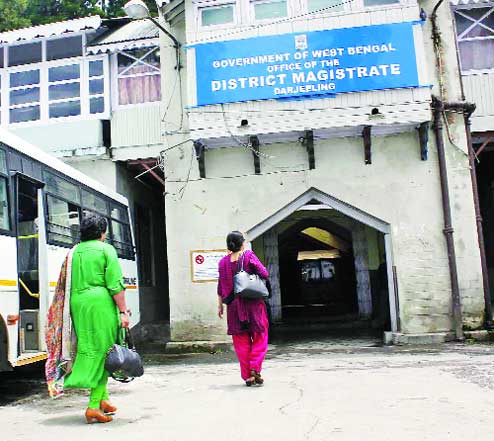 Mumbai, May 4: If Sonia Gandhi crosses the road outside 10 Janpath and takes a stroll in the garden of the house facing hers, she may notice that the plants are far more robust than they were a year ago.
Mumbai, May 4: If Sonia Gandhi crosses the road outside 10 Janpath and takes a stroll in the garden of the house facing hers, she may notice that the plants are far more robust than they were a year ago.
The farming formula has now been revealed by the occupant of the bungalow: Union minister, BJP leader and - as it turns out - master gardener Nitin Gadkari.
"I collected my urine in a small plastic can. And after collecting all of it in a 50-litre can - I have a big bungalow in Delhi. It used to be Madam Sonia Gandhi's bungalow. I have some one acre of farming land in my compound in the bungalow. There are some crops as well as some trees there.
"I called the gardener and instructed him to water some plants with this. And I'm telling you, there was such a big difference, they grew one-and-a-half times bigger than other plants," Gadkari is seen as saying on a video uploaded on YouTube by ABP Majha, the Marathi television channel owned by ABP, which publishes The Telegraph.
Gadkari, the Union surface transport minister, was addressing a workshop on fighting drought, organised for farmers by the BJP in Nagpur on Sunday.
Considering the sensitive nature of the subject against the backdrop of farm suicides and Rahul Gandhi's campaign, Gadkari was understandably keen to ensure that he was not misunderstood.
He began with the preamble: "Now I have done an experiment. I feel a little awkward but I will tell you about it. Please do not misunderstand. I have done an experiment."
2 Motilal Nehru Marg, the bungalow Gadkari was referring to, is situated opposite 10 Janpath. Sonia had not lived in 2 Motilal Nehru Marg but it used to be the office of the now-defunct National Advisory Council, which she headed.
Some organic vegetables meant for Sonia were grown on a patch of land at 2 Motilal Nehru Marg when the UPA was in power. After the BJP came to power, Gadkari is reported to have sent word to his neighbour that she would continue to receive the vegetables.
It is not known if the supply chain has withstood the vagaries of political Delhi in the past few months. If so, Sonia may have already noticed the qualitative changes in the greens although she is unlikely to have deduced the real reason, which has now been spilled by Gadkari.
Referring to high fertiliser prices, Gadkari, who was a minister in Maharashtra once, told the 200-odd farmers: "I am just telling you about urine, I'm not going any further than that. This is manure. You keep a 50-litre can in your house. You can try this out. This has urea and nitrogen. And, if you water an orange tree with this, you observe its growth rate. You observe the growth and number of flowers, fruit --- this is very good manure. To save money is to earn money. Being industrious and innovative is important."
Crop scientists say urine is indeed a source of nutrients for plants but only when used judiciously.
Cattle urine has always been mixed with cow dung and used as fertiliser, said D.L.N. Rao, a scientist who specialises in biofertilisers at the Indian Institute of Soil Science, Bhopal.
The uric acid in urine can harm plants but when mixed in soil, urine can serve as a source of urea and nitrogen, said Muneshwar Singh, a soil and fertiliser scientist at the IISS, Bhopal. But if it is applied at the same spot in the soil repeatedly, the cumulative high concentration of uric acid may be detrimental to plants, he added.
In 2009, Surendra Pradhan and his colleagues at the University of Kuipio in Finland observed that plants fertilised with urine produced four times more tomatoes than non-fertilised plants, and as much as plants that were given synthetic fertilisers.
The tone and countenance of Gadkari, as seen on the video, do not suggest that he was mocking the farmers, unlike the image portrayed by Ajit Pawar, the nephew of Sharad Pawar, when he made a reference to urine in 2013.
When a drought-hit farmer on hunger strike had asked Ajit, the then water resources minister of Maharashtra, why the dams in the state were not releasing water, the politician had said: "He has been fasting for the last 55 days. If there is no water in the dam, how can we release it? Should we urinate into it? If there is no water to drink, even urination is not possible."
The callous comment was one of the reasons cited for the defeat of the NCP, Ajit's party, in the subsequent Lok Sabha and Assembly polls.
Neither Ajit nor Gadkari can be considered political pioneers on the subject. Late Prime Minister Morarji Desai, who headed a government partnered by leaders of the latter-day BJP, was a long-time practitioner of urine therapy and, in 1978, advocated it as a medical solution for millions of Indians who could not afford treatment.
A common thread runs through the three urine specialists: all have held ministerial berths in Mumbai. Although Desai's birthplace is now in Gujarat, he was chief minister of Bombay State in the 1950s.
Additional reporting by G.S. Mudur










